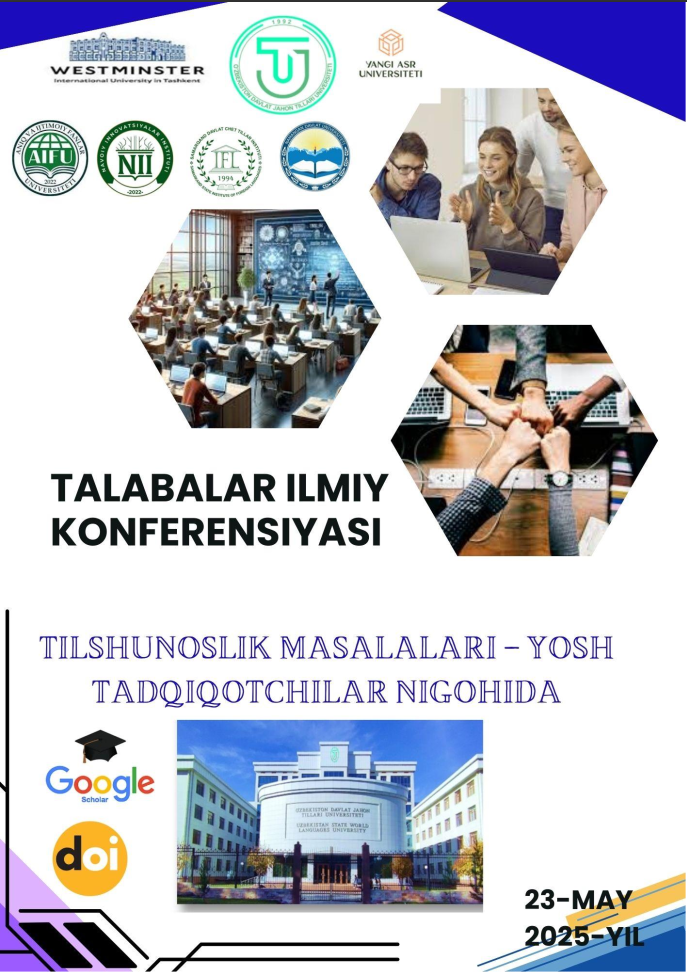TEACHING ENGLISH AS COMMUNICATION: A GLOBAL PERSPECTIVE
https://doi.org/10.5281/zenodo.15547576
Kalit so‘zlar
English language, communicative language teaching, global language, intercultural competence, functional fluency, learner-centered approach, language education, communicative skills, linguistic diversity, teaching methods, digital language learning, language policyAnnotasiya
In today’s fast-paced world, where English serves as a common across multicultural and multinational groups, teaching English as a means of communication allows on functional fluency, intercultural competence, and real-world language use. This approach emphasizes the importance of learner-centered approaches, realistic communicative tasks, and context-specific pedagogy to meet the needs of both native and non-native English-speaking environments. This material investigates how global perspectives influence curriculum design, teaching practices, and assessment methodologies, as well as the problems of implementing communicative language teaching (CLT) in a variety of socio-cultural and educational contexts. It supports for inclusive, adaptive models that value communicative skills over linguistic accuracy, thus enhancing learners' capacity to communicate effectively in international and intercultural settings. The global spread of English has necessitated a reevaluation of traditional language education paradigms, especially with the rise of English as a lingua franca (ELF) in many professional and social domains. This article further explores how digital technologies and online platforms are reshaping the teaching and learning landscape, enabling learners to access authentic language input and engage in intercultural exchanges beyond the classroom. The impact of socio-political factors and educational equity on language access and outcomes are also discussed, highlighting the need for policies that promote multilingualism alongside English proficiency.
Foydalanilgan adabiyotlar ro‘yhati
Abulkasimovna, E. Z., & Leonidovna, M. N. (2023, March). THE LEXICAL-SEMANTICAL USAGE OF PROFESSIONAL LEXEMES IN “UTGAN KUNLAR”(" PAST DAYS") BY ABDULLA QADIRI. In International Scientific and Current Research Conferences (pp. 20-22).
Brown, H. D. (2020). Teaching by Principles: An Interactive Approach to Language Pedagogy. Pearson Education, pp. 49–59.
Canagarajah, S. (2021). Translingual Practice: Global Englishes and Cosmopolitan Relations. Routledge, pp. 102–115.
Crystal, D. (2019). English as a Global Language. Cambridge University Press, pp. 35–48.
El Agez, B., & Rashidova, G. I. (2024). Authentic materials for teaching writing: a critical look. O ‘zbekiston davlat jahon tillari universiteti konferensiyalari, 21-30.
Gulomova, R. (2017). The importance of fairy tales in teaching English as a second language. Архивариус, 1(2 (17)), 27-29.
Larsen-Freeman, D., & Anderson, M. (2018). Techniques and Principles in Language Teaching. Oxford University Press, pp. 75–88.
McKay, S. L. (2018). Teaching English as an International Language: Rethinking Goals and Approaches. Oxford University Press, pp. 25–39.
Richards, J. C., & Rodgers, T. S. (2017). Approaches and Methods in Language Teaching. Cambridge University Press, pp. 60–72.
SULTONOVA, M. (2024). On the issue of critical thinking.

